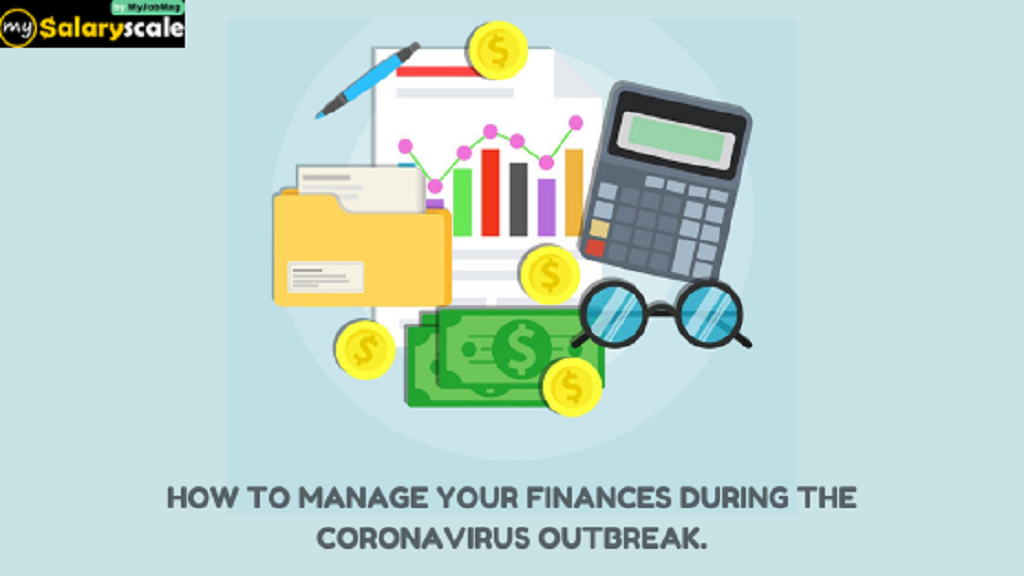We have seen how the coronavirus pandemic is affecting the economy, and with the level of unpredictability, you all may be worried about your finances.
Our aim at Mysalaryscale doesn’t stop at helping you find out your worth and earn more at work, but also, to teach you how to manage your finances especially at times like this.
So do not panic, because we are here to help you prepare for the financial uncertainty that most of us are facing right now.
Here are some tried-and-tested strategies we have put together for you to effectively manage your finances during the coronavirus outbreak.
1) Create a Budget: The essence of creating a budget is for you to track every bit of what you spend during the month so that you still have something to save.
So, to create a budget, you have to calculate the expenses you will make for that month and set savings goals but your focus should be on your basic needs.
After that, the next thing to do is, subtract the expenses from your income. If you have enough amount left to save from your deduction, congratulations, but if you don’t, then you may need to cut down your expenses a little bit more.
Don’t forget that every great financial plan starts with a sound budget, and a budget is your first step to making your financial goals a dream come true.
Let’s see how we can cut down the expenses
2) Remove Unnecessary Expenses: A change in the economy because of the coronavirus pandemic automatically affects income and will require a change in spending.
Understandably, most of you will be bored at this time because of the lockdown across states and countries and the boredom may lead you to make long calls, stream online, buy stuff online, or even subscribe.
All these little purchases here and there add up quickly and before you know it, you’ve overspent your budget and even tempted to tamper with your savings.
See How To Ensure Productivity While Working From Home
This may not be the best time for all that, and remember that the idea is to manage your finances.
So, I will advise you to track your spending and uproot unnecessary spending this period.
One of the best ways to do that is to prioritize your needs over wants by:
- Avoiding retail therapy and shopping online
- Avoid making calls for too long
- Avoid rushing to buy material things such as clothes, shoes, bags, etc.
- Cancel streaming services and any other services that qualify as “wants” for now.
3) Pay the Best Prices for Stuff: Ensure that you are paying the lowest prices for products and services this period. You can look out for discounts and cheaper alternatives.
4) Ration Your Supply: Food is one of the first things that run out at times like this so you may need to make it last. Here’s how:
- There may be power outages that could last for several days so try your best to find a substitute for the things that require refrigeration. For instance, you can consider buying eggs in place of meat.
- Healthy people can survive on half their usual food for an extended period, so if you can do that, give it a try.
- Don’t cook more than you can eat so that you don’t end up throwing food away.
5) Defer Payment of Interest on Loans: Some finance companies allow you to defer payment of interest on loans.
You can talk with your lender. They might have options to help you, it could be changing your due date or letting you skip payments of interest for some months.
You might even be able to negotiate a settlement. Explain that you can’t make the payments, then offer less than you owe, and see if they accept.
This isn’t likely to succeed unless you can convince them that you’re unable to pay, but it’s an option. Your credit will suffer if you settle, but at least you put the payments behind you.
6) Health is Wealth: If you want to save then you also have to take good care of your health especially during this time of isolation.
You have to be careful with your health so that you don’t fall sick as this will make you spend more trying to treat yourself.
You can take precautionary measures by preventing little illnesses like malaria or cold. This can be done by;
- using mosquito nets in your house;
- minimizing the use of air conditioner so that you don’t catch a cold (it will save some energy and you won’t spend much on electricity) especially when there’s fresh air oozing in through the window;
- You can exercise in your home.
If you can do these, the chances of falling ill may be poor.
7) Put Projects on Hold: building and any other ongoing project should be on hold for now. Don’t rush to invest your money on anything at the moment, wait till everything calms down.
Conclusion
Financial demand will increase from family and friends this period, make sure you don’t assist more than you can so you don’t spend out of your savings.
Let your priority at the moment be the essential and unavoidable expenses.
Be careful that your food budget isn’t completely out of control and you come out of this with way more debt than you expected.
The current problem we are facing right now is real, we should understand that the most immediate economic impact is on cash so we should not neglect it. There is no solution yet so let us prepare but not fear or panic because things will still return to normal sooner than later.
So once you have your money under control, start saving because when unexpected things like coronavirus outbreak happen, the money you set aside will be useful.




